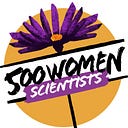
Gage: Quashing the Matilda Effect
Decades of emphasis and concerted efforts have not adequately addressed inequities in science, from lack of pay parity to lack of acknowledgement of the scientific contributions and accomplishments of women and non-binary individuals. For too long, the loudest and most overrepresented voices of science in the public were from cis white men — their perspectives are elevated and amplified in high-profile articles, conference panels, and boards. Media stories are assigned, reported, and presented by men by a huge margin, and this imbalance is reflected in how frequently women are consulted and quoted. Most keynote speakers at conferences are men. Panels are so frequently all-male that a new word evolved to describe the phenomenon: manels.
These imbalances add up and reinforce the inaccurate perception that science is stale, pale and male. Even though women make up half of the population and are a critical part of the scientific community, their voices have been stymied and/or disproportionately low. The lack of representation ultimately leads to fewer leadership opportunities to women in science, especially women who face additional and intersectional forms of discrimination.
These inequities in science are also reflected throughout society.
It is time for a change.

If we want to close the gender gap, we must hear more diverse voices — in the media, at scientific conferences, in academia, government, in leadership positions.
In January 2018, the Request a Woman in STEMM (Request) platform was born with the mission to help change the perception of what a scientist looks like. We at 500 Women Scientists were tired of the overrepresentation of men’s voices in science — everywhere we looked, men were too often the keynote speakers, panelists, experts quoted by the media, experts in Congressional testimonies, and “the scientists” in the public sphere. The Request a Woman in STEMM (Request) directory is a public-facing database of women scientists based around the world, founded in January 2018 by a cohort of 500 Women Scientists leadership team members. The platform connects our extensive multidisciplinary network of vetted women in science with anyone who needs to consult a scientist for a news story, invite a keynote speaker or panelist for a conference or workshop, find a woman scientist to collaborate on a project, or serve as a subject matter expert in any capacity.
We created the Request platform as a one-stop open access global interdisciplinary directory to make it easier to find a woman expert and harder to make excuses for why only men were invited or consulted.
No more excuses: An open-access and international online directory.
Since its inception, Request has grown quickly to include thousands of women from around the world:

- In 2018, ~7,500 experts from 133 countries joined with 174 scientific disciplines represented (check out our paper highlighting the growth of the platform in its first year).
- The Request database was accessed more than 100,000 times by journalists, conference organizers, school teachers, and other scientists.
- 23% of the Request directory members identified as coming from underrepresented minorities (URMs).
- In 2019, the directory grew to more than 12,000 experts.
- By the end of 2020, 14,000 experts from 146 countries had joined to be listed / included in the directory by the end of 2020.
From the outset, the Request database has been searchable by geographic region, field of expertise, and keywords selected by the women experts who are in the database. In our effort to build the Request platform quickly, the original platform was built with scotch tape and sticks (free Google Forms and Tableau versions). It was such a runaway success that we very quickly outgrew free tools. With generous funding from Lyda Hill Philanthropies and Simon’s Foundation Science Sandbox, Request got a major upgrade in 2019 and gained improved search functionality, translations into six languages (Spanish, Portuguese, Simplified Chinese, Italian, French and German), individual member profiles, a user option to save searches, data security, and the inclusion of medical professionals.
With the growth of the directory in breadth of discipline and expansive geographic representation, we recognized a need for greater ambition. Our work is not done!

Meet Gage
Today, we are introducing Gage, the world’s largest directory of brilliant women and gender minority experts. Gage has the same backbone and mission as Request, but updated with a more inclusive language for gender minorities. It also has a sleeker design and highlights the different existing and possible uses of the directory to support increased engagement.
Gage is named after suffragette Matilda Gage after whom the Matilda Effect is dubbed. The Matilda Effect refers to the tendency to overlook the roles, contributions and achievements of women in scientific progress, innovation, and invention. The Gage platform eliminates any excuse for falling into the Matilda Effect and we think it is a perfect homage to a woman who was overlooked for her contributions and advocacy for the rights of women, Black and Native Americans.
Whats in store?
We have big goals for Gage in 2021 and beyond — we aim to grow the platform to 20,000 experts and add more functionality, like enhanced search features and more integration with other 500 Women Scientists projects, such as Wikipedia Edit-A-Thons, Pods, and Fellowship for the Future.
Are you organizing a conference or panel? Do you have a burning question in the field of science, technology, engineering, mathematics, or medicine? Head over to Gage to find an expert and help elevate the public sphere with more diverse voices. This diversity drives better solutions to societal problems.
Tell us what you think about Gage: gage@500womenscientists.org
Written by the founders of Gage: Dr. Elizabeth McCullagh, Dr. Katarzyna Nowak, and Dr. Jane Zelikova
